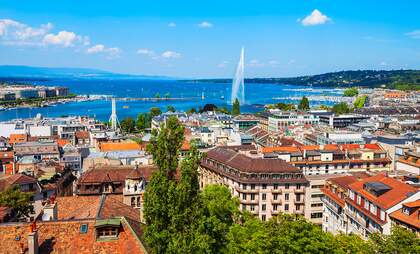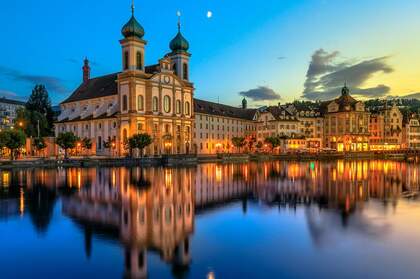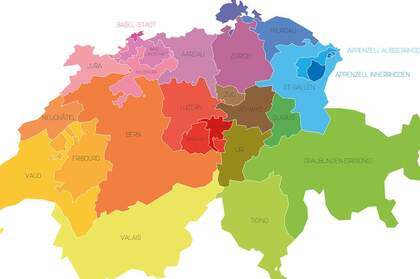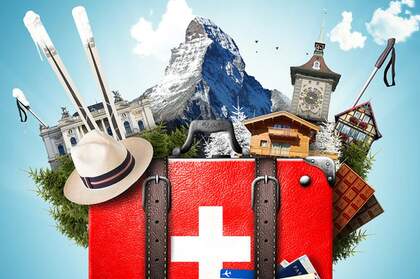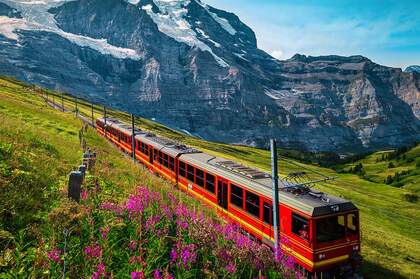If you find yourself in Geneva, you will find the most beautiful of Swiss cities. Our expat city guide has loads of useful information to help you make the most out of your time in the city.
Geneva city guide
Geneva is the second-most populous city in Switzerland, only behind Zurich, and the capital of the Republic and Canton of Geneva. The city boasts some of the most beautiful scenery, numerous heritage sites and a proud history and culture. Located in the very west of the country, right near the border with France, Geneva is primarily French-speaking and French culture can be seen permeating throughout the city.
The city is famous for its central location in history, having been involved in numerous, significant, world events. It is perhaps most well-known for the signing of the Geneva Conventions, which set down an internationally recognised set of rules regarding warfare and the treatment of soldiers. The city’s international connections run deep, with it also being the location for the headquarters of the United Nations and the Red Cross.
A short history of Geneva
The city of Geneva began its story as a small gallic town, which was taken over by the Romans in 121 BC. In 58 BC, Julius Caesar used the town as a base for his campaign against the Gallic tribes and established Geneva as a Roman city. The city was invaded by Germanic tribes in the 5th century and eventually became part of the Holy Roman Empire.
Conflict with the counts of Savoy
The city was ruled by a bishop since the end of the Roman era, who was invested with imperial power after having gained the status of prince-bishop. The bishop was at odds with the counts of Geneva, who owned the land on which the city was built. However, once the main local lord's family line died out, the House of Savoy from Italy inherited their lands and began a power struggle with the bishop for control of the city.
In 1447, The House of Savoy elevated a member of its own family, Antipope Felix V, to the position of bishop of Geneva. The noblemen of Geneva managed to reach an agreement with its new ruler for the establishment of the Grand Council, a democratically elected body that represented the citizens of the city and elected the bishop.
Friction continued to grow between the Dukes of Savoy and the Grand Council, especially after Duke Charles III of Savoy appointed his cousin as bishop. The Grand Council attempted to fight against the appointment, but the city was invaded twice by Savoyard forces to force the decision through. The first invasion ended in severe punishments for the Grand Council. The second invasion led to pro-independence factions gaining support and establishing a majority in the Grand Council.
The council voted for independence from Savoyard rule and made an alliance with Canton Bern and Fribourg, making Geneva allies of the Old Swiss Confederacy, which swore to protect Geneva and its territories.
The Protestant Reformation
As part of their alliance with Bern, the city declared itself Protestant. While this justified dissolving the position of bishop, it also alienated the Catholic cantons and even some of the city’s citizens. Many of the city’s citizens did not relate to the German-speaking canton of Bern, as well as the teachings of Martin Luther and Ulrich Zwingli.
This matter was solved by John Calvin, a French theologian who became spiritual leader of the city, at the behest of the Grand Council. Calvin was popular and successful in getting the city to accept Protestantism while overseeing the cities' growth. At this time the city developed significantly, with new industries, trades and higher education starting to emerge around the city.
The city strengthened its alliance with the Protestant cantons of Bern and Zurich; however, it was repeatedly blocked from joining the Old Swiss Confederacy by the Catholic cantons. The House of Savoy tried once more to take the city in 1602, however, they were defeated, and the Genevan victory is still celebrated to this day.
Class struggles and annexation
The city became increasingly aristocratic towards the end of the 17th century, as noble French Protestant families or Huguenots sought refuge in Geneva. Over the course of the 18th century, class struggles developed as a result. Residents found it increasingly difficult to become citizens and the rich all but controlled the city's industries and utilities. However, Geneva prospered during this time, attracting and producing world-renowned academics like Voltaire and Jean-Jacques Rousseau.
Geneva was annexed by France in 1798, but, due to Napoleon’s distrust of the city, it gradually declined. “The city where they know English too well,” according to Napoleon, began to fall into recession.
Return to power
At the Congress of Vienna, in 1815, after the fall of Napoleon, Geneva’s territories were expanded to 15 Savoyard and six French communes. It was also finally admitted to the Swiss Confederation as a full member. The aristocracy took back control of the city for a time, but subsequently declined and were replaced. During this time, Geneva began to grow into a modern city. In 1907, the city underwent the separation of the church and the state in a newly drafted constitution.
After the World Wars, Geneva became the seat of many international companies and organisations, including the League of Nations, its successor the United Nations and the International Labour Organisation, leading to further development of the city through tourism and business. The city also became known as a neutral place to conclude treaties and other diplomatic business, with the Geneva Convention being signed there.
The city also made history in 1960 when it became one of the first Swiss cantons to grant women the right to vote in both cantonal and communal elections. In 1995, Switzerland proved to still be popular with international organisations, as the World Trade Centre was established in the city.
What to do in Geneva: Sightseeing and activities
There are so many sights and activities in Geneva, just take a walk through the city and you’ll find something to do. However, if you’re looking for inspiration, check out our list below.
Check out Geneva’s famous city centre
There are so many sights around the city of Geneva, it would take too long to even list all the highlights. However, if you find yourself in the city, make sure you spend an afternoon losing yourself in the picturesque historic city centre, the Vielle-Ville. The meandering cobblestone streets hide beautiful fountains, terraces and quaint little coffee shops just waiting to be found. Just south of the city centre is a small quarter called Carouge. The area is a hotbed of antique dealers, markets, souvenir shops and vintage stores.
The city is also filled with historic monuments and buildings. Geneva’s St. Pierre Cathedral is a must-see, offering spectacular views from its towers and an underground archaeological site. The Palais des Nations, the office of the United Nations is also worth a visit, as is the historic Maison Tavel.
A city of museums
Geneva is home to some of the world’s most spectacular museums. Even the buildings that house the exhibitions are pieces of art in their own right. Take the Art and History Museum for instance, not only does it host a vast collection of Swiss and Genevan art, as well as a collection of Byzantine artefacts, the museum itself stands majestically in the centre of the city. The Musée Ariana is another beautiful building; a neo-baroque palace housing stoneware, ceramics and glassware from all over the world.
There are several other distinct museums that are sure to pique your curiosity situated in Geneva. Any budding watchmakers should check out the Patek Philippe Museum, while the International Red Cross and Red Crescent Museum, the Museum of Far Eastern Art and the Natural History Museum all make for an interesting visit.
Lake Geneva
It is impossible to visit Geneva without spotting the lake. Lake Geneva is an area of absolutely stunning natural beauty, with absolutely breathtaking views of the mountains and hills that surround the lake. There are plenty of activities to be found around the lake too, from markets to the gorgeous Lavaux vineyards, as well as more touristy stuff, like ziplining, boating and cycling.
While enjoying your time by the lake you might catch a glimpse of a tall plume of water shooting into the sky. This is Geneva’s famous Jet d’Eau, a monumental jet of water that is propelled into the air at 500 litres a second. The jet used to be a hydraulic safety valve but was eventually made into a permanent landmark.
So many attractions
Geneva is home to many unique attractions, like the European Organisation for Nuclear Research, or CERN. Headquartered in Geneva, the centre is open for visitors, who can take part in organised tours or visit one of its two museums. Another famous attraction is the Bains des Pâquis, public baths that can be found situated on Lake Geneva. Here, visitors can take part in activities, swim and attend events, as well as relax in the sauna or Turkish baths.
The city is also home to plenty of scenic parks and outdoor areas. The Conservatory and Botanical Garden is first among these, boasting thousands of different species of flower in a myriad of flowerbeds, greenhouses, ponds and themed gardens. Another nice park to spend an afternoon at is the Parc de la Grange, in which the remains of an old Roman villa and an astonishing rose garden is situated.
The Parc des Bastions is also certainly worth checking out. The park features life-sized chess boards and pieces, ping-pong tables and even an ice skating rink in the winter. You can also find the international monument of the Reformation in the park, which features the statues of John Calvin, John Knox, Theodore Beza and William Farel.
Public transport in Geneva
There are plenty of public transport options in the city of Geneva. The city is well connected internationally, as well as to other places within the canton. Public transport in the city is provided by TPG transport association. It also has the second largest airport in Switzerland.
Annual events in Geneva
Geneva hosts some magnificent and globally famous events every year. Make sure you check out these highlights during your time in the city.
L’Escalade
When the Savoy armies tried to take the city in 1602, an elite team was sent to climb the city walls and sneak into the city under the cover of night. They were stopped when a cook spotted them and dumped a pot of vegetable soup on them. Today, Geneva still celebrates “L’Escalade” with a costumed parade and climbing race, as well as little chocolate cauldrons filled with vegetable-shaped treats.
Grand fireworks display
Originating as a feature of the now-defunct Geneva festival, the grand fireworks display lights up the lake every year in August, making for a breath-taking spectacle.
Fête de la Musique
Every summer, Geneva hosts a citywide music festival and an eclectic mix of artists from all over the world come to play in venues across the city.
Mirabaud Regatta
Also known as the Bol d’Or, the Mirabaud Regatta is the biggest inland lake regatta in the world. Every year, over 500 boats sprint the length of the lake and race back to Geneva.
Jobs in Geneva
Being a centre for finance and the home to many international organisations, there are plenty of opportunities for work in Geneva. Looking for a job? Check our list of jobs.
Housing in Geneva
Fallen in love with Geneva? The city offers some beautiful places to live. Check out our list of available housing in Geneva.

